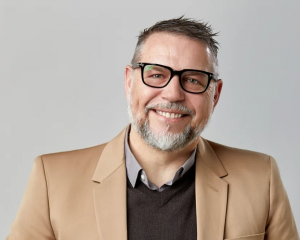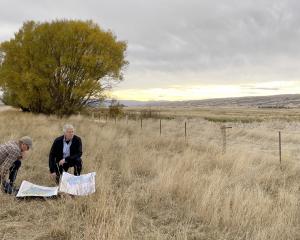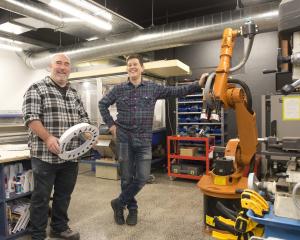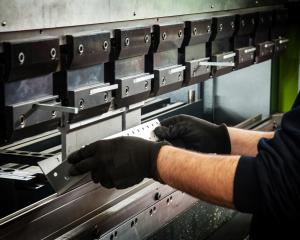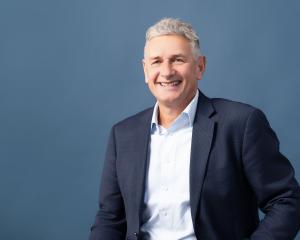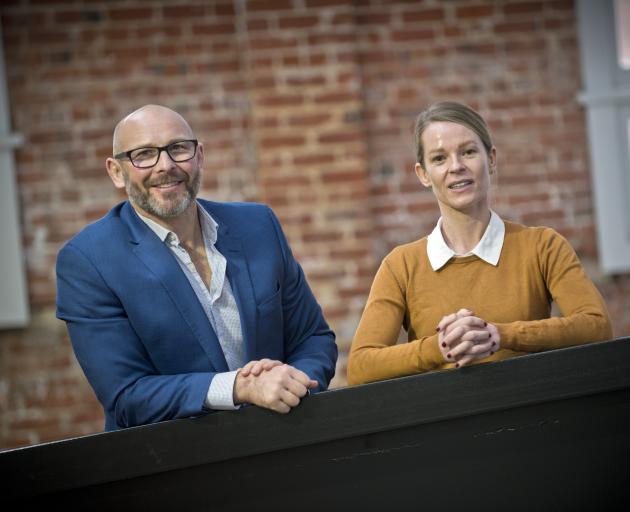
When former All Black hooker Tom Willis first walked through the door of Dunedin law firm Gallaway Cook Allan a decade ago, he readily admits he "didn’t know his ear-hole from his elbow".
He might have had a law degree to his name but any potential career in the legal profession had been put on the back-burner as he pursued a professional rugby playing career.
Ten years later, Mr Willis (43) is still at the firm where he has recently been made a partner, along with Kimberley Langridge, who is based in its Wanaka office.
Both were head prefects of their respective Otago schools — Mr Willis was head boy at King’s High School and Ms Langridge (36) was head girl at Dunstan High School — and, after stints away, returned to live in the region with their families.
Growing up in Alexandra, Ms Langridge always thought she was going to be a criminal lawyer, fascinated by criminal law television programmes, though she also toyed with joining the police for the same reason.
While studying at the University of Canterbury, she would head to court in her spare time to watch criminal trials.
She ended up getting a job in Christchurch doing property and commercial work, an area of the law where she has stayed.
Once in practice, she realised criminal law was not like it was depicted on television, and it was no longer her dream.
In contrast, Mr Willis never initially had a burning desire to be a lawyer. He took a variety of papers to get started at the University of Otago, including law, and was fortunate enough to "make the cut" for law school after his first year.
"I thought, ‘that’s an option, I’ll give it a go’."
So he completed a law degree, juggling studies with playing rugby, something that he acknowledged was not easy.
"It involved not going to a lot of lectures, borrowing a lot of notes, and often travelling around the southern hemisphere — and, in some cases the northern hemisphere — with a large stack of legal texts," he recalled.
He believed, with the demands on current professional rugby players, it would be even more difficult now.
Mr Willis played for Otago, Waikato, the Highlanders and the Chiefs, before playing overseas.
He played seven times for the All Blacks.
He captained the side in two midweek matches on its European tour at the end of 2001, in his debut against Ireland A and also against Scotland A.
He then featured in five All Black tests in 2002.
He finished his law degree in the infancy of his professional rugby career and then focused on his sport.
By the time he was "old and slow" and knew it was coming to an end, he recognised he needed "a real job", he said.
Professional rugby was not like baseball, basketball or premier league soccer — "it was clear you need a job at the end. At that point, I had a law degree so I thought, ‘maybe I’ll give that a go’."
During his sporting career, as part of his professional development, he did get some experience working in a law firm in Hamilton — "albeit doing nothing very useful".
He also tracked a barrister while living in Wales, where he was based for five years, but none of it was major.
"We’re just talking about someone dropping in and getting a flavour for this."
While it was a forecasted end to his sporting career, Mr Willis acknowledged it was also a ‘bit of a scary time", and one that most professional sportspeople face.
After living overseas for five years, he and his family needed somewhere to live and he needed a job.
Dunedin was home for him and he was fortunate to secure a position as a law clerk at Gallaway Cook Allan in July 2012.
The opportunity to make contact with the firm was facilitated through sports lawyer and agent Warren Alcock, a former partner at the firm who is now a consultant, and who looked after Mr Willis’ rugby affairs.
Mr Willis acknowledged it was a fairly steep learning curve, although what he did have was a very different set of life skills to many other law graduates. He also completed the professional legal studies course required for admittance to the bar as a solicitor.
Ms Langridge spent two years in a Christchurch law firm and then did postgraduate study, qualifying to become a teacher.
With a strong interest in education — something that was also a family interest — she was not entirely sure about law at that stage. On reflection, that was largely perhaps to do with the environment she had been working in at the time, she said.
Towards the end of her postgraduate studies, the Canterbury earthquakes happened. She and her husband moved to Perth and Ms Langridge worked for the Law Society of Western Australia as a non-practising lawyer, initially in the legal education team — a "great marriage" of her skills — and then the policy team.
It was an interesting experience to work in law but not in practice and she doubted whether she would ever go back to private practice.
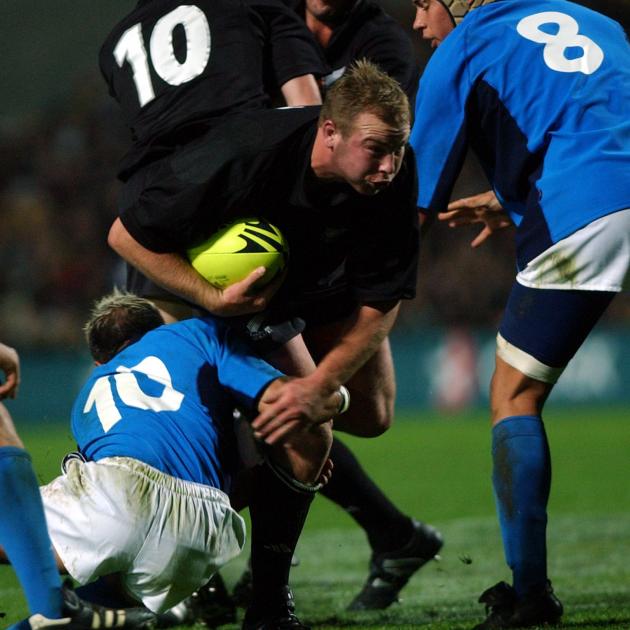
Moving to Wanaka at the beginning of 2016, with their 8-month-old daughter, Ms Langridge stayed at home with her for the rest of that year.
She had started "putting feelers out", as she contemplated what she was going to do career-wise, and contacted Gallaway Cook Allan.
Returning to private practice was back on the agenda and there was ongoing dialogue with the firm about possible opportunities.
While she did not have first-hand knowledge of the firm, her interest in Gallaway Cook Allan was based on research. It sounded a forward-thinking firm and she liked the representation of women at senior management level.
She had a chat with Wanaka-based partner Andrew Lovelock and, while there were no roles available, they decided she would start on a part-time basis as a legal executive in February 2017.
Having been out of practice for a few years, Ms Langridge recalled being concerned as to whether she would still remember everything.
But it started "all coming back" and, within a few weeks, both she and Mr Lovelock agreed she should probably get her practising certificate.
There was a large property focus in her role, including a lot of subdivision and development work. She also did some local authority property work, and general commercial, so it was very broad.
While the Dunedin office was much bigger — the firm employs 90 staff across its Dunedin and Wanaka offices — she quipped the Wanaka office had "the view".
One of the big benefits for her of working in a smaller branch office was having all the infrastructure and support from the wider firm — "the best of both worlds", as she put it.
It was a full service firm and, while it was a little more general practice in Wanaka, it was "incredibly helpful" to be able to pick up the phone and talk to an industry leader in the team and get them involved.
Firm-wide events were held and there were daily interactions; she was regularly in the Dunedin office, while Dunedin-based staff loved coming to Wanaka and spending time in that office.
Wanaka was also an ideal place for an outdoors-lover like Ms Langridge, a qualified yoga instructor who also enjoys mountain biking.
Mr Willis said the firm’s values and mission statement resonated with him. One of its mottos was it liked "doing good things with good people" — and that was by getting straight to the point, based on experience, empathy and expertise. That had provided him with a "guiding light" on how he liked to practice.
He was proud to be employed by a firm with such an established history and one that provided a comprehensive law service.
It was formed in July 2001 through the merger of the Cook Allan Gibson and Gallaway Haggitt Sinclair practices and the history of the firm in Dunedin could be traced back to 1859.
Mr Willis worked in the firm’s agri-property team which could involve a simple "Mum and Dad" conveyance, through to helping families with succession planning.
He got a "kick out of helping people" get transactional work done in an efficient way, while endeavouring to minimise the legalese — the specialised language of the legal profession.
While a certain level of academic skill was required to be a lawyer, it was not all about that, Ms Langridge said.
Emotional intelligence, a pragmatic nature, an ability to empathise with people, and "to put your head down and work hard" went a long way in the profession, she said.
Being at university and being in practice were quite different experiences. That was where it was important to have good practitioners around to help and mentor law graduates through that transition and set them up with good habits.
That was what they were aiming to do at Gallaway Cook Allan with the talent being brought through — empowering and equipping them to have a successful career, she said.
Reflecting on her earlier thoughts of not continuing with a legal career, Ms Langridge said she thought her first working environment was what law firms were like.
Once she started with Gallaway Cook Allan, she realised there could be an "amazing culture", coupled with really interesting work.
Being a partner of the firm, and involved at management level in terms of decision-making with the partnership group, was an exciting opportunity. She had been keen to learn more about the "inner workings" of the firm and it was nice to be part of that.
For Mr Willis, it was also an exciting new challenge. For the past 10 years, he had had his head down trying to develop and prove his technical skills as a lawyer.
Now he got to look through a different lens — being involved in the management of the business was "another hat" to wear and new territory — and he was "up for a challenge".
He enjoyed working at the firm, saying staff were very well looked after. At the moment, he particularly liked the "real commitment" to evolving with the challenges occurring in both the community and the economy.
As far as sport these days, Mr Willis said his career pathway was "pretty all-consuming". He would like, in the future, to give more of a contribution to rugby, a sport which had been so good to him.
In the meantime, he was an enthusiastic supporter and watcher of rugby, and coaches the Southern under-10s.
"We try and keep it pretty real... that’s good fun," he said.

